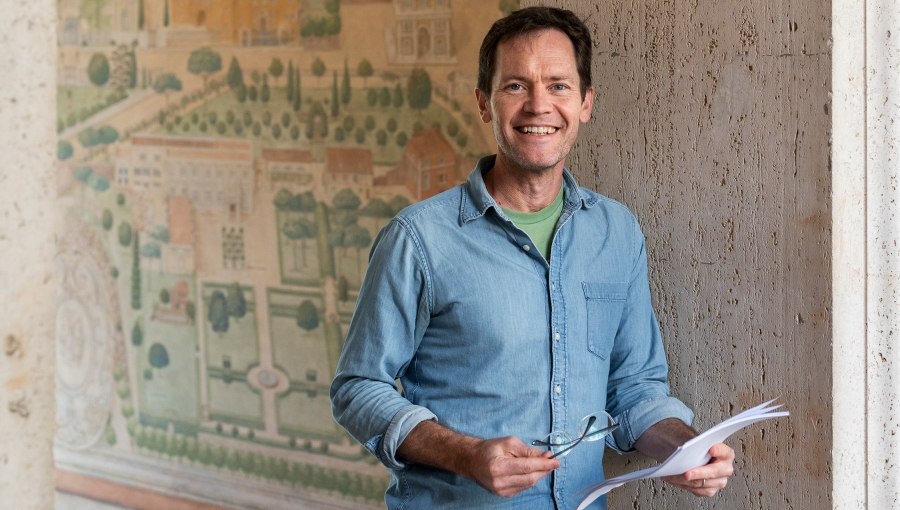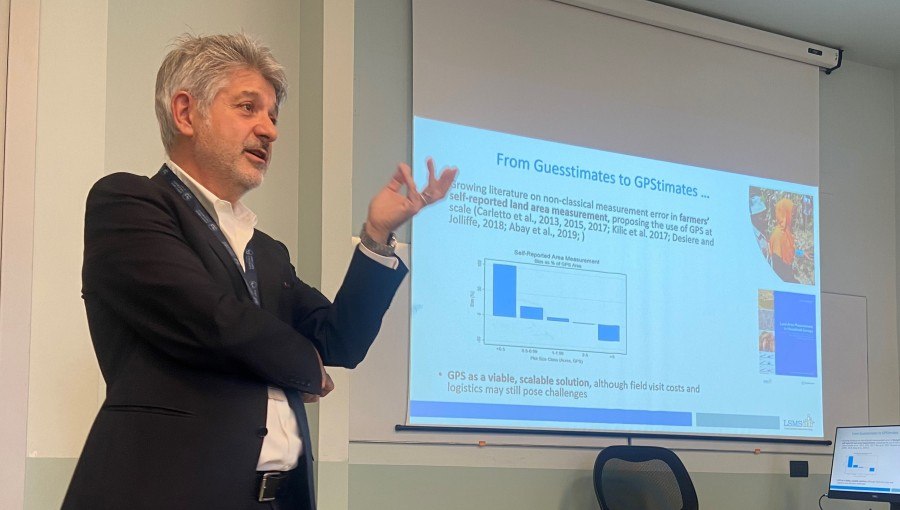A Commitment to Excellence: Professor Sergio Scicchitano
Originally from Catanzaro, a city in the Calabria region in the south of Italy, Professor Sergio Scicchitano teaches Economics at JCU, where he is currently the Chair of the Economics Department. Professor Scicchitano holds a Ph.D. in Economics from the University of Rome “La Sapienza.” An applied economist, he has over 15 years of experience as a teacher, researcher, and policy analyst. His paper “Working from home and income inequality: risks of a ‘new normal’”, published in the Journal of Population Economics in 2021, won the prestigious Kuznets Prize and has received over 500 citations so far. He is currently Section Editor of the Handbook of Labor, Human Resources and Population Economics, Springer eds., the leading book in labor economics, and Associate Editor of the Eurasian Economic Review (EAER), ed. Springer, an important economics journal.
What brought you to JCU?
After my Ph.D., I worked as an economist for the Italian government, managing negotiation and institutional relations with the European Commission, OECD, and other international institutions. Then I was a Teaching Fellow in Econometrics for Finance at Queen Mary University of London – School of Economics and Finance. I came back to Italy when I accepted a position of Senior Researcher at the National Institute for Public Policies Analysis (INAPP).

But since I love teaching and interacting with students, I wanted to return to academia full time in order to share my knowledge and expertise with them. I started as an adjunct professor at JCU and rediscovered my passion for teaching. I love the JCU atmosphere, and I have realized that it is a wonderful place to work. I love being in an international environment, and I like the American yet international liberal arts environment that encourages students to compare alternative methodological approaches.
How did you become interested in economics?
I believe that you study economics because you want to understand and change the world. There are many types of inequalities in our world that need to be investigated and reduced: gender inequality, income inequality, inequality of opportunities, intergenerational inequality (one’s family background significantly influences the chances of success). The role of the economist is to help leave a better world to our children
Tell us about your recent article “On the emergence of cooperative industrial and labor relations.”
The article was published in the British Journal of Industrial Relations, one of the world’s leading journals in the field. The paper deals with the role of social capital and trust in relation to non-family members in promoting cooperative industrial relations in a large sample of Italian companies. The idea, based on the work of American sociologist Robert D. Putnam, is that medieval communes fostered individual participation in public life and cooperative attitudes outside the close ties of family members, which in turn fostered trust and cooperative labor relations.
More specifically, we examine the long-run determinants of contemporary differences in the degree of cooperative labor relations at the local level. We do this by estimating the effect of medieval communes on various proxies for current cooperative labor relations. Conditional on a large set of firm- and community-level controls, as well as a full set of provincial fixed effects, we find that firms located in municipalities that were medieval free communes in the past have higher current probabilities of adopting two-tier bargaining structures and of being unionized. We also report instrumental variables and propensity score estimates that confirm our main results.
What other projects are you currently working on?
In 2024 I published five papers on topics such as gender pay gap, working from home, Neets, natural resources and family management in the journals Corporate Governance, Applied Economics, Resources Policy, Feminist Economics, Futures. I am editing two special issues in leading journals on “The Economics after the COVID-19” and “Population Change: Implications for the Environment, Society, and the Economy.” I am currently working on several other projects on working from home, artificial intelligence, technology and labor market, intergenerational inequality, overeducation, polarization, entrepreneurship, school tracks, higher education institutions. I just finished a research assistantship with a student from JCU on “Working from home in the post-covid-19 age.”
What is your teaching philosophy and what would you like students to take away from your classes? What have you learned from your experience as a professor?
My teaching philosophy reflects a balance between what I perceive as the most valuable outcomes of an education. In my opinion, an ideal education environment should offer students the possibility to acquire foundational knowledge, learn how to perform intellectual activities in a rigorous and critical manner, acquire skills that enhance their chances to succeed in future endeavors, and learn how best to interact with the broader intellectual community and apply the skills acquired in the job market. Over the years, I have gained experience in implementing this philosophy as a teacher of microeconomics, macroeconomics and econometrics.
Why should students study economics at JCU?
Studying Economics is a super exciting process. It is a strong path which requires a solid foundation in mathematics and statistics. In the Department of Economics, we are committed to excellence in teaching and instilling in our students the excitement of studying economics and finance as well as an appreciation for rigor and formal modeling. Our faculty members offer expertise in a variety of topics, have published articles in international peer-reviewed journals, authored books, and are active in the community. Most importantly, they are excellent teachers dedicated to their students’ learning
Nowadays, it is difficult to be informed citizens without having a basic understanding of economics. Moreover, economic principles appropriately implemented by policymakers lead to outcomes which benefit all of society. The study of economics and finance at JCU provides insights into a wide range of forces that shape our economy. When combined with training in quantitative reasoning, offered by our Minor in Mathematics, it provides an excellent foundation for just about any career. Indeed, firms highly value individuals who have been intrepid and resilient enough to undertake the challenge of studying economics and finance at an American university abroad, like JCU.
At JCU students learn how to develop critical thinking skills and to use the analytical tools of economics and statistics to gain a better understanding of the most pressing economic and social issues of our time. Our department curriculum emphasizes analytical rigor, the use and interpretation of empirical and historical evidence, and the development of accurate, well documented, and articulated written arguments. Students acquire a set of practical skills, making the Economics and Finance major a gateway to reputable graduate schools and a broad array of careers in business, law, journalism, public policy, and government.





